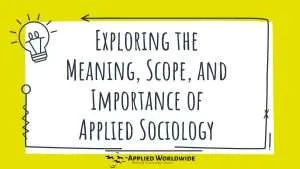Small business owners face numerous challenges, from limited resources to fierce competition. However, imagine a scenario where a small business owner decides to hire a sociologist as a consultant. In this blog, we will explore the valuable skills and knowledge that a sociologist can bring to the table, ultimately assisting small business owners in navigating the complex social and human aspects of running a successful enterprise. With that said, let’s jump into our discussion of sociology and small business.
Understanding the Sociologist’s Role
Sociologists specialize in understanding human behavior, social dynamics, and the complex interactions that underlie our society. Their unique perspective can be a game-changer for small business owners. Here’s how a sociologist can provide essential support:
Market Research and Consumer Behavior
Sociologists have an in-depth understanding of consumer behavior that goes beyond demographic data. They can help small business owners identify and understand their target audiences’ motivations, preferences, and social influences, allowing for more effective marketing and product development.
Community Engagement
Sociologists can assist small business owners in building strong relationships with their local communities. By conducting ethnographic research, they can identify community needs, values, and sentiments, helping businesses align their offerings with community interests.
Diversity and Inclusion
Small businesses that embrace diversity and inclusion can tap into a broader customer base. Sociologists can help business owners develop strategies that promote inclusivity and ensure their products or services resonate with a diverse range of customers.
Employee Relations
Creating a positive work environment is crucial for small businesses. Sociologists can offer insights into the dynamics within the workplace, helping business owners address issues related to employee satisfaction, teamwork, and productivity.
Ethical Business Practices
Sociologists can guide small business owners in making ethical decisions, from supply chain practices to community involvement. By considering the social and cultural implications of their choices, businesses can maintain a strong ethical foundation.
Neighborhood Insights
Understanding the neighborhood in which a small business operates is vital. Sociologists can provide data and insights on local trends, demographics, and social dynamics, helping business owners tailor their strategies to the specific needs of their community.
Social Impact
Many customers now prefer to support businesses that have a positive social impact. Sociologists can help small business owners identify opportunities to give back to their communities or support social causes, which can enhance brand reputation and customer loyalty.
Crisis Management
In times of crisis, a sociologist can help small business owners understand the social and cultural implications of their actions. By being sensitive to community sentiments, businesses can better manage PR crises and mitigate damage to their brand.
Employee Training and Development
Sociologists can contribute to effective employee training programs. Their expertise in understanding how individuals learn and adapt to new environments can help small businesses improve employee onboarding and development.
Sustainable Practices
Environmental and social sustainability are key concerns for modern consumers. A sociologist can guide small business owners in adopting sustainable practices that align with societal expectations and contribute to a more environmentally responsible business model.
Final Thoughts on Sociology and Small Business
Sociologists offer a valuable and unique perspective that small business owners can leverage to address complex social and human aspects of running a business. By partnering with sociologists, small business owners can better understand and respond to the diverse needs, values, and challenges within their communities and workplaces.
This collaboration ultimately enables small businesses to make more informed decisions, develop stronger connections with customers and communities, and navigate the intricate web of human interactions in the modern business landscape. In a world where authenticity, ethics, and social responsibility hold increasing importance, the insights of a sociologist can be a game-changer for small business success.
Gina M. Finelli, PhD: Sociology and Family Business Advising







